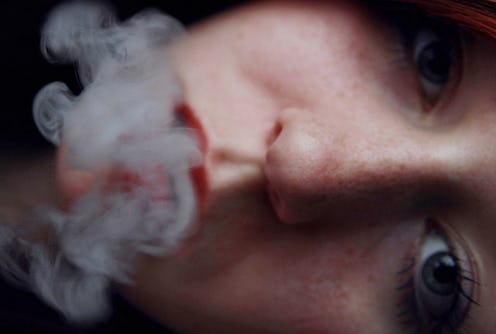Life
5 Reasons We Ignore The Red Flags

It's a phenomenon we all know too well: We all have that friend or parent or sibling who, despite a dozen well-intentioned loved ones' warnings, goes ahead and gets into a relationship that's not right for them at all. It's easy enough to look back in retrospect and see how clearly you really did know that something was bad for you; Youdid see that danger was ahead, only to ignore it and go forth anyway. We have a tendency to ignore red flags, even when they're significantly abundant, and stick to our ideas regardless. There are a number of reasons for this. Here, the 5 most relevant ones, regarding why we refuse to listen, and do what we know is best for us in the end:
We cling to what's comfortable and familiar, even if it's bad for us
We are psychologically and biologically programmed to desire steadiness, certainty and comfort. This is equatable to survival. It means that we've ensured our existence for at least as long as we can maintain whatever it is we have in our lives. This is the main reason we accept less-than-ideal situations for ourselves: if it's tolerable, we think it's acceptable, and we confuse "acceptable" with "ideal," because that's what our survival instincts would have us believe.
We doubt our instincts when they tell us something is wrong
Even when we do see flashing red flags, we don't know how to identify them as red flags because we don't trust ourselves or our ability to accurately gauge a situation. We've been wrong in the past. We could be nit-picking. We tell ourselves that we ultimately have to overlook the not-so-desirable traits someone possesses to love them for who they really are; we shouldn't be so judgment and hold such impossible standards for other people to be perfect. Maybe, we tell ourselves, we're egregiously overreacting and need to just relax. But there is a difference—an enormous difference—between accepting someone entirely and willfully overlooking signs that indicate they could actually be truly detrimental to our well-being.
We don't see things as they are—we see them as we are
The downside of feeling strong, confident, positive and healthy, is that you can project those qualities onto things and people who don't merit them. In the same way that being in a bad mood can make even good things seem awful, being in a great place and wanting love and happiness can cause you to erroneously see it where it doesn't exist. If we're in a place of simply just needing to believe a lie to make ourselves feel better, we will. If we choose to overlook the ways we're not being good to ourselves, we'll be equally as inclined to disregard the ways other people do the same.
We choose the mistake because we want the lesson
Sometimes, we do see the red flags—and we go into something anyway. We subconsciously know that there is tremendous learning potential in every experience—even the worst ones give us something incredible to learn. Do I mean to imply we intentionally hurt ourselves? Not quite. We subconsciously but still intentionally choose to have experiences that will grow, heal and change us in the end, even if they hurt like hell initially. Sometimes we have to be smacked awake. Sometimes we need to see what's wrong to know what would be right. There's nobody in the world who knows how to police us into a better life more than ourselves.
Despite all the reasons not to be, we're still hopeful
Really, despite all the evidence stacked in the favor of love being a lie and a good life an obsolete or elusive phenomenon only achieved on Pinterest boards, we still have hope. We're still swiping our way into a date Friday night, or applying to a new job (if not just simply hoping for something else to come along). We sometimes overlook the red flags because we actually want to see the best in everything, and it's in realizing that we disillusioned ourselves about reality that we become jaded with the world. It was never a matter of what happened on the outside, it was only how we assumed things would ultimately be.
Images: brokenneverbeat/Flickr; Giphy (4)